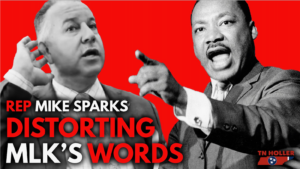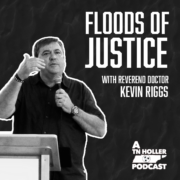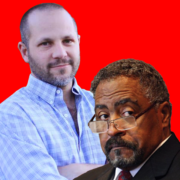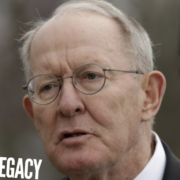
Mike Sparks is facing an extremely difficult election this cycle. Brandon Thomas is a young, black man with a progressive platform and widespread support, particularly among young people. He’s energetic and has put in the work to make personal connections with a huge swath of the district’s electorate.
Sparks, by contrast, has spent much of his time defending the bust of KKK Grand Wizard Nathan Bedford Forest in the state’s capital and claiming to the Tennessee Holler that he doesn’t know why the civil war was fought.
He even took some time out of this busy schedule to pen an Op-Ed for the Murfreesboro Voice in defense of Trump loving Ex-Democrat John DeBerry.
In it, he claims that DeBerry is some kind of victim for having been ousted from the Democratic ticket over his litany of absurd statements and positions. This is, of course, absurd, as the Democratic Party is a political organization with every right to decide not to lend its apparatus to a candidate who does not fit with their values. Unlike Sparks’ Republican Party, which seems to jump frantically from one ideology to another in pursuit of power, the Democrats seem to have at least some standards.
I don’t find myself overly disturbed by Sparks’ defense of DeBerry, however. This is run-of-the-mill culture war nonsense that Republicans always gin up a month or so before an election to drive out their base. It’s ridiculous, but it comes with the territory. I do take issue with Sparks’ appropriation of the language of resistance, which he does so brazenly that I can only assume that he is as ignorant of its context as he is of our own state’s Confederate history.
The absurdity begins as he mentions the iconic anti-fascist poem by German pastor Martin Niemoller, “First They Came…” Sparks doesn’t actually quote any lines from the poem, likely because the very first line of the poem’s most famous form is “first they came for the Socialists, and I did not speak out- because I was not a socialist.”
This isn’t a poem about a wealthy, longtime state representative being removed from his party for supporting a fascist president. It’s about the ways in which authoritarian governments divide their population and attack those in the political, religious, and racial minorities while assuring all others that they’re safe as part of the majority.
It’s a critique of the “Us versus Them” mentality.
Does this sound familiar? One example might be an authoritarian president building a campaign on the claim that a large portion of Mexican immigrants are dangerous criminals, or banning a religious minority from entering the country.
Another example could be a clownish Governor and entrenched supermajority passing laws that target protestors and strip them of their voting rights for the crime of daring to speak up in defense of black life. I wonder what Mike Sparks would have to say about events like that?
It’s the excerpt from Martin Luther King’s “Letter from Birmingham Jail,” which is the most egregious, however. Unlike the poem, of which one could give Sparks the benefit of assuming ignorance, he adamantly claims to have read this document, and yet his understanding of it seems to be on the level of someone who skimmed Dr. King’s work for quotes that could be construed to agree with him.
He goes with the oft-quoted warning that “In the end, we will remember not the words of our enemies, but the silence of our friends.” This is a remarkably convenient line for Sparks, and is so removed from its context as to be nearly meaningless. However, to find this line, he was forced to sift through a mountain of criticism for laws that look identical to the anti-protest bill that he just voted for!
For an obvious example, Dr. King says that “there is nothing wrong in having an ordinance which requires a permit for a parade. But such an ordinance becomes unjust when it is used to maintain segregation and to deny citizens the First-Amendment privilege of peaceful assembly and protest.”
This speaks to a greater tendency among the right to quote Dr. King while categorically refusing his key claim that all actions must be viewed within the context which has given rise to them. This is what Dr. King meant when he said that “riots are the language of the unheard,” and it is absolutely central to his brilliant understanding of opposition to hierarchy and oppression.
While Brandon Thomas travels the district meeting constituents and accepting endorsements from workers unions and activist groups, Mike Sparks spends his time defending the racist authoritarians of the past like Nathan Bedford Forest, and the racist authoritarians of today like Donald Trump.
He is a voice for the powerful against the powerless, an advocate for order at the expense of justice.
He is what Dr. King would call “the white moderate, who is more devoted to ‘order’ than to justice; who prefers a negative peace which is the absence of tension to a positive peace which is the presence of justice; who constantly says: ‘I agree with you in the goal you seek, but I cannot agree with your methods of direct action.’”
No man who votes to protect a bust honoring a KKK Grand Wizard or strip voting rights from peaceful protestors for “camping” should be using the words of Dr. King or Pastor Niemoller. We cannot allow the defenders of power and authoritarianism to co-opt the language of true, profound resistance to such horrors.
We should learn from our history, so that men like Mike Sparks aren’t able to distort it for their own agenda.
Brendon Donoho is a student at MTSU, president of MTSU Young Democratic Socialists of America, and a resident of Rutherford County










